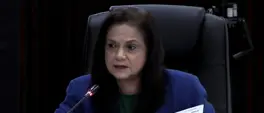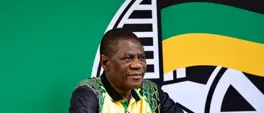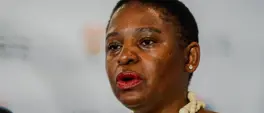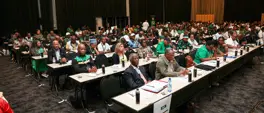CHRISPIN PHIRI | In a world of narratives, Tshidi Madia sought the truth
Guest contributor
3 September 2025 | 11:56Tshidi didn't just report on what people said; she was determined to find the facts behind the stories. While this earned her notoriety in some circles, it earned her the respect of most.

An image of late EWN Associate Politics Editor, Tshidi Madia, at her memorial service at Primedia's headquarters in Sandton, Johannesburg on 2 September. Picture: Sphamandla Dlamini & Katlego Jiyane/EWN
In South Africa's highly polarised political landscape, it's often tempting for journalists to simply become purveyors of competing narratives, presenting one side's story against another's.
But the late Tshidi Madia was a journalist who fundamentally rejected this conveyor-belt approach. She embodied a principle often attributed to journalism professor Jonathan Foster: "If someone says it's raining and another person says it's dry, it's not your job to quote them both. Your job is to look out the window and find out which is true."
Tshidi didn't just report on what people said; she was determined to find the facts behind the stories. While this earned her notoriety in some circles, it earned her the respect of most.
Her work served as a powerful critique of the South African journalistic landscape, showing that true reporting isn't about giving equal airtime to opposing claims, but about actively seeking out the truth, no matter how difficult or uncomfortable that might be.
Tshidi Madia’s legacy stands as a beautiful and necessary testament o a profound idea: that journalism, at its highest calling, is not a profession but a vocation of power committed to the light. Her work transcends the mere chronicling of events - the he-said-she-said of daily narratives - and ascends to the more rigorous and courageous plane of truth-seeking.
IN PICS: Colleagues & friends honour Tshidi Madia at emotional memorial service
[WATCH] | Primedia mourns the loss of political journalist Tshidi Madia
In an age saturated with opinion, conjecture, and manufactured reality, she demonstrated that the journalist's most sacred duty is to be an unwavering counterweight.
This is not a passive role. It is an active, often difficult, commitment to excavate fact from the rubble of spin, to hold a steady lantern in the fog of propaganda. She understood that to simply "report narratives" is to risk becoming a conduit for power, an echo chamber for the already loud and influential. Instead, she chose the path of the examiner, the skeptic, the translator of complexity for the public good.
Her courage was rooted in a deep and abiding respect for the citizenry. She operated on the foundational belief that the public does not need to be told what to think, but deserves the verified, contextualized information with which to think for itself.
This is the essence of fact-based journalism, it is not the end of a conversation, but the beginning of an informed one. It is the gift of clarity in a chaotic world, a service that treats democracy not as a spectator sport, but as a participatory endeavor that thrives on illumination.
Thus, Tshidi Madia’s body of work is more than a collection of articles; it is a moral compass for the field. It reminds us that true power in journalism is not found in access or affinity to the powerful, but in an unassailable commitment to those without it. Her legacy is a quiet, persistent call to all who would pick up a pen or a microphone: to be a seeker first, a chronicler second, and to always, always side with the truth.
In an era where a social media post has become newsworthy , and traditional news sources are ideologically and commercially contested, Tshidi had the ability to navigate through the changing media landscape. In a manner that in spared many readers from the pitfalls of keyboard journalism.
In a landscape of noise, Tshidi Madia’s legacy endures as a beacon of rigorous integrity. She embodied the conviction that journalism’s highest calling is not to narrate power, but to interrogate it with unwavering intellectual courage. Her work remains a masterclass in the pursuit of truth - a pursuit that is, in itself, the most profound tribute to the public good.
Robala Ka Kgotsho Matshidiso.
Chrispin Phiri - Spokesperson International Relations and Cooperation Ministry
Get the whole picture 💡
Take a look at the topic timeline for all related articles.
















